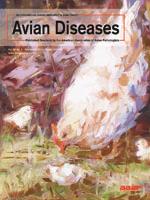Real-time quantitative reverse transcriptase–polymerase chain reaction (qRT-PCR) assays have been used to detect the presence of challenge virus when the efficacy of infectious bronchitis virus (IBV) vaccine against field viruses is being experimentally evaluated. However, federal guidelines for licensing IBV vaccines indicate that challenge-virus detection following vaccination is to be conducted in embryonated eggs. In this study, we examined qRT-PCR data with the use of universal and type-specific primers and probe sets for IBV detection and compared those data with challenge-virus detection in embryonated eggs to determine if the two methods of evaluating vaccine efficacy are comparable. In addition, we tested the qRT-PCR assays on thermocyclers from two different manufacturers. We found the universal IBV primers and probe set to be comparable to challenge-virus detection in embryonated eggs. However, for some IBV types (Mass41 and Conn on the SmartCycler II and Ark, Mass41, Conn, and GA98 on the ABI 7500) the qRT-PCR assay was more sensitive than virus detection in embryonated eggs. This may simply be due to the universal IBV qRT-PCR assay being more sensitive than virus detection in eggs or to the assay detecting nucleic acid from nonviable virus. This finding is important and needs to be considered when evaluating challenge-virus detection for vaccination and challenge studies, because qRT-PCR could potentially identify positive birds that would otherwise be negative by virus detection in embryonated eggs; thus it could lead to a more stringent measure of vaccine efficacy. We also found that the IBV type-specific primers and probe sets designed in this study were in general less sensitive than the universal IBV primers and probe set. Only the Ark-DPI–specific assay on the SmartCycler II and the Ark-DPI–, Mass41–, and DE072/GA98– (for detection of GA98 virus only) specific assays on the ABI 7500 were comparable in sensitivity to virus detection in eggs. We found that a number of variables, including the virus type examined, primers and probe efficiency and stability, and assay conditions, including thermocycler platform, can affect the data obtained from qRT-PCR assays. These results indicate that qRT-PCR assays can be used to detect IBV challenge virus, but each assay, including the assay conditions and thermocycler, should be individually evaluated if those data are expected to be comparable to virus detection in embryonated eggs.
Detección del virus de la bronquitis infecciosa mediante métodos de transcripción reversa y PCR en tiempo real cuantitativos y su correlación con la detección del virus en huevos embrionados.
Los ensayos de transcripción reversa y reacción en cadena de la polimerasa en tiempo real (qRT-PCR) se han utilizado para detectar la presencia de virus de desafío cuando se evalúa experimentalmente la eficacia de virus vacunales de la bronquitis infecciosa (IBV) contra virus de campo. Sin embargo, los lineamientos federales para la concesión de licencias de vacunas contra la bronquitis infecciosa indican que la detección del virus de desafío después de la vacunación se debe llevar a cabo en huevos embrionados. En este estudio se analizaron los datos por qRT-PCR con el uso de conjuntos de iniciadores y de sondas universales y específicos para la detección del virus de bronquitis y se compararon estos datos con la detección del virus en huevos embrionados para determinar si ambos métodos son comparables en la evaluación de la eficacia de las vacunas. Además, se analizaron los ensayos de qRT-PCR en termocicladores de dos fabricantes diferentes. Se encontró que los iniciadores y sondas universales para bronquitis infecciosa son comparables a la detección de virus en huevos embrionados. Sin embargo, para algunos tipos del virus de bronquitis (Mass41 y Conn con SmartCycler II y Ark, Mass41, Conn, y GA98 con el ABI 7500) el ensayo de qRT-PCR fue más





